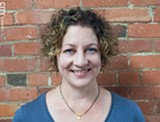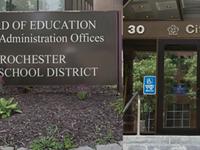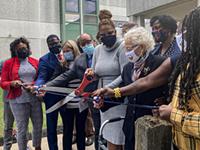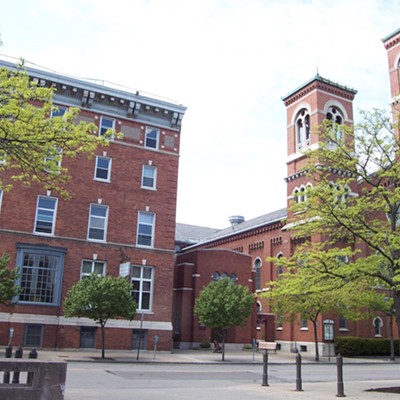[
{
"name": "500x250 Ad",
"insertPoint": "5",
"component": "15667920",
"parentWrapperClass": "",
"requiredCountToDisplay": "1"
}
]
The Rochester school board has implemented more than a few controversial and contentious policies over the years. But its school choice policy is in a class of its own.
While some people extol the policy, critics say that school choice is bureaucracy at its worst and that it, ironically, doesn't guarantee that students will get into their preferred schools.
The policy, which basically assigns students to schools, is undergoing a serious review for the first time in years, although no one anticipates that the district will completely eliminate its "managed choice" model.
The current policy gives parents — within pre-established parameters — options regarding where their children go to school. But many parents and residents long for a return to neighborhood schools, and some Rochester school board members would like to see the current school choice policy revised in a way that puts greater emphasis on them.
"When I was campaigning, if there was one issue that was consistently of concern to parents and residents across the city, it was neighborhood schools," says school board member Elizabeth Hallmark.
Hallmark heads the task force that's reviewing the school choice policy and says that there's a frustration with the school choice policy that doesn't go away.
But school choice is a complex issue in an urban district with more than 50 schools, and untangling the policy's many threads will be difficult. Its far-reaching tentacles touch on everything from curriculum and staffing to soaring transportation and building maintenance costs. It also affects the city's neighborhoods and, arguably, its real estate values.
But for Hallmark, the debate over school choice vs. neighborhood schools is about inequalities and fairness.
Children shouldn't have to go across town to find a good school or have to walk through unsafe neighborhoods on their way to school, she says. They should be able to find that equal opportunity for a quality education right in their neighborhood school, Hallmark says.
And parents living in a city neighborhood that they like shouldn't have to contemplate getting their child into a charter school, a private school, or moving to the suburbs where school districts typically have more resources, she says.
School choice was one of the pillars of former president George W. Bush's No Child Left Behind legislation. Parents shouldn't be forced to keep their child in a failing school because of their ZIP code, proponents said. And opening up the school bureaucracy to competition would force schools to improve to attract students, they said.
The Rochester school board adopted its policy for student placement in 2002 and revised it slightly in 2008.
In the 2015-2016 school year, the district had eight citywide elementary schools which drew students from all over the city. Another 32 elementary schools are divided into three zones: Northeast, Northwest, and South.
Parents typically make their school selections when their children are enrolled in either prekindergarten or kindergarten for the elementary grades. With some exceptions, parents can apply for a first, second, and third choice within their zone or a citywide school. (Students in grades 7-12 are not restricted by zones and can apply to any school.)
Parents are likely to get their child placed in their neighborhood or home school, those that are closest to the student's residence, when it's their first choice, school board member Willa Powell says.
But placement can get complicated quickly, like when parents pick a popular or citywide school such as School 58, for example. That school uses a lottery as part of its selection process.
If the parent chooses School 58 as first choice and the neighborhood school as second choice, they risk not getting either one, Powell says. That's because the neighborhood school may be filled by students who made it their first choice, she says.
And then there are many schools that are under-chosen often based on faulty perceptions about the schools, Powell says. Frequently those schools end up being filled by the district with students whose parents did not participate in the selection process, so they risk becoming schools with the least amount of parent involvement. It's a problem that can self-perpetuate, making it difficult for the school to improve.
Adding charter schools to the mix hasn't helped, Powell says.
And not all parents seem to want their children to attend their neighborhood school for any number of reasons. In 2001, for instance, 59 percent of elementary students attended their neighborhood school, but last year that number dropped to just 16 percent.
The concept of neighborhood schools is driven to some extent by nostalgia, Powell says. But lifestyles are different from 30 or 40 years ago, she says, when families, grandparents, and aunts and uncles lived within doors of each other.
Parents may select a school because it's on their route to work, they've heard positive things about it on social media, or they don't want their child walking to school. Assuming that parents don't select a neighborhood school because it is low-performing isn't accurate, Powell says.
Further complicating the matter is what district officials refer to as structural displacement. Some neighborhoods have lots of children living near more than one school, while other neighborhoods are almost childless. Schools in those neighborhoods would be almost vacant if students weren't bused to them.
Ralph Spezio, retired principal of School 17, is perhaps best known for his campaign to increase awareness about lead poisoning's impact on city children. He's now trying to build public awareness around the importance of neighborhood schools.
Spezio was warned that School 17's enrollment would drop precipitously if he stopped busing students there from all over the city. But the opposite happened, he says.
"At one point, I was 30 students shy of 1,000, all from the neighborhood," he says. "School 17 was the center of an urban village. It was vibrant."
Spezio went door to door to meet parents and came to know them all by name, he says. If a parent came to the school, he dropped everything to meet with them, he says.
"Everyone knew this was my policy, even the superintendent," Spezio says. "To be successful in this work you have to build trust with the parents and that will translate to the kids. I would walk down the street at 5:30 and people would ask me to come in for dinner. That's what you want. It's all about relationships."
Spezio says that school choice can be revised in a way that still allows for parental choice without cancelling out neighborhood schools. He says that better communication with parents and doing more to help them through the selection process is important.
He says that the district also has to get legislators to provide more funding for busing, so that parents aren't making their school selections based on safety concerns in their neighborhood.
And he says that the school choice policy is an area where the district and the city need to work together on addressing housing and education.
"This is a wonderful opportunity for the city and school district because the busing is tearing our neighborhoods apart," he says. "Parents will tell you that the current policy works against what the city is trying to do to create healthy, safe neighborhoods."
Speaking of...
Latest in News
More by Tim Louis Macaluso
-

RCSD financial crisis builds
Sep 23, 2019 -

RCSD facing spending concerns
Sep 20, 2019 -

Education forum tomorrow night for downtown residents
Sep 17, 2019 - More »









